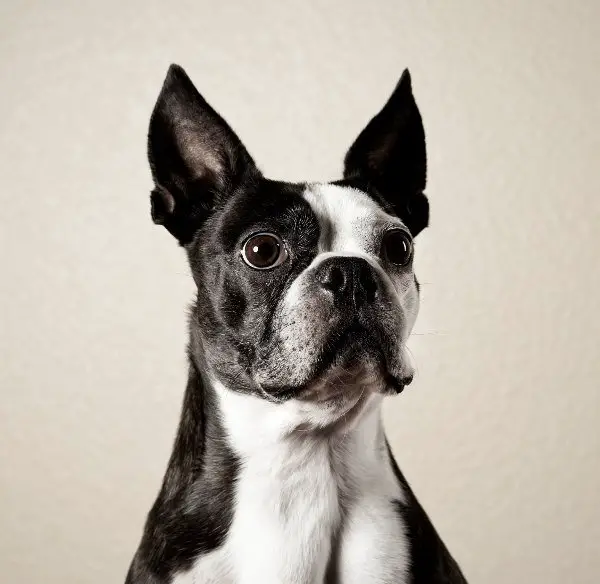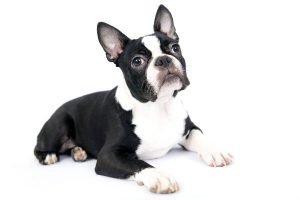
Boston Terrier Breed Profile
The smallest of the Bulldog family, Boston Terriers are boisterous, intelligent, and exceptionally affectionate companions for any home.
- Strong Personality
- Family Friendly
- 11-13 Years
Jump to Boston Terrier information
Whats the Boston Terrier's history and background?
Another small breed that is a favourite among city dwellers, the Boston Terrier is a low maintenance breed that has a large following in the UK, outside of its native New England home. Fiercely loyal and eager to please, Bosties are perfect dogs for first time dog owners.
The resemblance to their Bulldog cousins is clear when looking at the Boston Terrier, with the brachycephalic skull, short, muscular legs, and pointy ears. The history of the Boston Terrier dates back to around 1875 to a man named Robert C. Hooper and his dog named Hooper’s Judge, a bulldog and terrier mix dog that was purchased from Liverpool, England and shipped to Hooper’s homeland in Boston, Massachusetts. Robert C. Hooper was something of an English Bulldog and English White Terrier (now extinct) cross aficionado, a very popular mixed breed dog during the late 19th Century in the UK, in particular for northern mining districts and cities such as Liverpool. The dogs were favoured in the UK due to their skill of catching rats and prowess as fighting dogs, boisterous, confident and similar in appearance and temperament to the English Bulldog.
Hooper’s Judge is attributed to being the ancestor of all true modern Boston Terriers, and he is said to have been a mix of the English Bulldog, English White Terrier, and French Bulldog. This became the foundational breeding mix for Boston Terriers, however the appearance in the 1800s bore little resemblance to the dogs we recognise today. The Bulldog had longer legs and tail, with an undershot jaw and slimmer in stature. The same is true for the French Bulldog, then known as the Toy Bulldog, which was higher on the leg and lighter in build.
The Boston Terrier proved exceptionally popular among the Bostonian locals with the upper classes who resided in an area of the city named Beacon Hill. The Bulldog/ Terrier mixed dogs were companions of the coachmen in Beacon Hill, these coachmen were usually immigrants from north England and brought with them the knowledge of dog breeding. The English coachmen started to cross breed their dogs with those of their employers, likely without their consent. The result of which was a smaller companion dog to the taller, original mixed breeds of the longer legged Bulldogs and Terriers of the day.
What's the Boston Terrier's Behaviour & Personality like?
- Boston Terriers are perfect companion dogs, they form close bonds with their owners and have large personalities. Make sure your dog isn’t left alone for too long as they can develop separation anxiety.
- This breed can be extremely strong willed, meaning socialising and training from a young age is recommended. Boston Terriers are known to be over protective of their owners at times, particularly the males. Setting clear expectations and a home dynamic is key to avoid your dog thinking themselves an alpha of the pack.
- Boston Terriers are perfect family dogs and for first time owners, full of energy, compassion and love to clown around with their owners, they’ll love being the centre of focus for the household.
How to groom a Boston Terrier
- Boston Terriers are extremely easy to maintain when it comes to grooming. Their short coats only need brushing through around once a week, this will remove any dead hair or skin, and allows for strengthening of the bond between dog and owner.
- Use a soft bristle brush on your Boston terrier, as they have a thin, sensitive skin that may be irritated or torn with stronger brushes.
- Boston Terriers should be bathed infrequently, a few times a year is usually enough, or when muddy or smelly. With such short coats, over-bathing will strip the dogs of their natural oils, removing the shine of the coat and also potentially causing skin irritation.



How much exercise does a Boston Terrier need?
- Boston Terriers need only a moderate amount of exercise, two brisk walks a day should cover it, aiming for around 40 mins of exercise per day minimum. This makes Boston Terriers perfect for those who have less time for walks or live a more sedentary lifestyle.
- That being said, the breed is prone to weight issues so ensure your dog is getting a daily run out, this will also help avoid any behavioural issues arising, as these intelligent dogs need daily stimulation to avoid getting bored and disruptive
What training does a Boston Terrier need?
- Boston Terriers are easy to train due to being natural people pleasers, they’re intelligent and eagerness to learn makes them great for first time dog owners.
- It’s important to socialise your Boston Terrier from a young age to avoid territorial or antisocial behaviours, and continue this socialising into adulthood. This will enable your dog to have a healthy, non-overly protective, relationship with you and others. additionally there should be significant focus on the recall command to combat the strong prey drive of this sight hound.
- Boston Terriers excel at obedience tasks, and are regulars at dog shows as a result. Teach your pup basic commands from a young age to keep them engaged and under control.
What is the average lifespan of a Boston Terrier?
- Boston Terriers can live up to around 11-13 years when given daily exercise and a nutritional diet, however there are a few health issues to look out for, as with many brachycephalic dogs.
What are common health issues for Boston Terriers?
- Overheating is a common issue in these dogs due to their short noses and long palates, which restricts air flow in brachycephalic dogs, reducing the effectiveness of panting. Keep an eye on your dog in summer months and avoid strenuous exercise.
- Their large upper bodies in comparison to small legs can cause a knee issue known as patellar luxation, where the kneecap slips out of place and the dogs begin arching their back, moving weight to their front legs. Although painful, this can be corrected with surgery.
- Their large, wide set eyes can be targets for dust and debris which means eye injury can be fairly common.
- As with all breeds, especially brachycephalic dogs, ensure you are getting your Boston Terrier from a responsible breeder and conduct a DNA test to spot any issues early on in the dog’s life.

